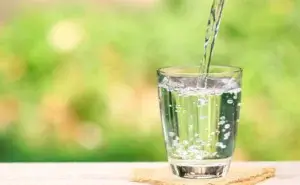
The Power of A Digital Detox: Revitalizing Your Life
The Power of A Digital Detox: Revitalizing Your Life A digital detox is needed now more than ever, as digital devices are our most valuable

Welcome to our exploration of the incredible world of perspiration in “Sweat It Out.” In this journey, we’ll dive into the science behind sweating and shed light on why this natural process is not only good for you but an essential aspect of a healthy lifestyle.
We will uncover the various ways in which sweat contributes to physical, mental, and even emotional well-being. From detoxification to the undeniable link between sweating and stress relief, our journey will traverse the many dimensions of this often-overlooked natural bodily function.
Join us as we embrace science and celebrate the marvel that is sweating. Whether you’re a fitness enthusiast, someone looking to understand the benefits of an active lifestyle, or simply curious about the inner workings of your body, “Sweat It Out” aims to be your guide to appreciating the beauty and significance of perspiration.
So, grab your water bottle, lace up those sneakers, and let’s embark on a journey to discover why breaking a sweat is not just a physical activity but a testament to the incredible synergy between our bodies and the world they navigate. Get ready to be inspired, informed, and motivated to embrace the human sweat for all the right reasons!

Sweat, also known as perspiration, is a clear, watery fluid produced by the sweat glands in the skin. It is a crucial physiological process that helps regulate body temperature, maintain hydration, and contribute to overall health. Sweat is primarily composed of water, but it also contains small amounts of electrolytes, minerals, urea, and other substances.
Eccrine Glands:
Found all over the body, especially on the palms, soles, and forehead.
Eccrine sweat glands are responsible for regulating body temperature through the production of watery sweat.
Apocrine Glands:
Located in areas with a high concentration of hair follicles, such as the armpits and groin.
Produce a thicker, milky sweat that is rich in proteins and becomes odoriferous when it comes into contact with bacteria on the skin.

Sweating is a natural and essential bodily function with numerous health benefits. From regulating body temperature to promoting detoxification, here are some of the key advantages of sweating:
Sweating is the body’s primary mechanism for cooling down. As sweat evaporates from the skin’s surface, it releases heat, helping to regulate body temperature during physical activity or exposure to warm environments.
The body’s natural response to infection includes an increase in body temperature, known as fever. Fever is a part of the immune system’s defense mechanism, as it can enhance the activity of immune cells and inhibit the growth of certain pathogens, including Mycobacterium tuberculosis.
Fever often leads to an increase in body temperature. Sweating is one of the mechanisms the body uses to cool down and regulate its core temperature. While sweating itself does not directly fight tuberculosis germs and other dangerous pathogens, the overall process of fever, followed by sweating, is part of the body’s strategy to create an environment less conducive to bacterial growth.

Sweat contains small amounts of toxins, including heavy metals and certain chemicals. Through perspiration, the body eliminates these substances, promoting the body’s own detoxification system.
Clearing Pores: Sweating opens up pores and helps clear accumulated debris, reducing the risk of acne and other skin issues.
Antimicrobial Properties: Sweat contains antimicrobial peptides that can protect the skin from skin infections.
Dilation of Blood Vessels: Sweating leads to the dilation of blood vessels near the skin’s surface, enhancing blood circulation and nutrient delivery to the skin and muscles.
Caloric Expenditure: Sweating is associated with physical activity, contributing to caloric expenditure (amount of energy (calories) that an individual expends or burns over a specific period) and promoting heart health.
Blood Pressure Regulation: The process of sweating helps regulate blood pressure by increasing blood flow and promoting vasodilation.
Exercise-induced sweating can trigger the release of endorphins, hormones that act as natural stress relievers and mood enhancers.
Some research has investigated sweat samples to assess stress levels. Cortisol, a stress hormone, can be detected in sweat, providing a potential non-invasive method for evaluating stress responses.
Caloric Burn: Sweating during physical activity contributes to burning calories, which can support weight loss and weight management.
Improved Metabolism: Regular exercise, leading to increased sweating, can boost overall metabolism.
Reduced Inflammation: Sweating helps regulate body temperature during exercise, reducing the risk of overheating and inflammation.
Joint Lubrication: Increased circulation and fluid exchange during sweating can contribute to joint lubrication.
Regular exercise and sweating may contribute to a stronger immune system by promoting the circulation of immune cells and antibodies.
The cooling effect of sweating before bedtime can contribute to better sleep by promoting the body’s natural temperature drop during the sleep cycle.
Regular exposure to sweating, especially during intense exercise, can enhance the body’s ability to tolerate heat, improving overall endurance.

While sweating is good for you and offers numerous health benefits, it’s essential to stay hydrated to replace the fluids lost during the process. Additionally, individuals with certain medical conditions, such as heart issues or excessive sweating disorders, should consult healthcare professionals for personalized advice. Overall, embracing physical activity and sweating as part of a healthy lifestyle can contribute to improved physical and mental well-being.
While excessive sweating (hyperhidrosis) can pose challenges, insufficient sweating capacity or anhidrosis can also lead to various problems. Sweating is a crucial physiological mechanism that helps regulate body temperature and contributes to overall health. If the body is unable to sweat adequately, it may result in the following issues:
The primary function of sweating is to cool the body through evaporation. Without this cooling mechanism, individuals may be more prone to overheating, especially during physical activity or exposure to high temperatures.
Insufficient sweating increases the risk of heat-related illnesses such as heat exhaustion and heatstroke. These conditions can be serious and even life-threatening if not addressed promptly.
Sweating is a key component of the body’s thermoregulatory system. An inability to sweat impairs the body’s ability to maintain a stable internal temperature, leading to discomfort and potential health risks.
During physical activity, the body generates heat, and sweating helps dissipate it. Without proper sweating, individuals may find it challenging to engage in exercise without experiencing discomfort or overheating.
Sweating is one way the body loses fluids. In the absence of sweating, individuals may have difficulty staying adequately hydrated, increasing the risk of dehydration.
Sweat helps keep the skin moist and can contribute to the elimination of toxins and dry skin itself. Without sweating, the skin may become dry, increasing the likelihood of skin issues such as dryness, irritation and an increased risk of developing rashes.
Sweating is not only a response to physical heat but also to emotional stress. An inability to sweat in response to stress or anxiety may lead to an impaired emotional cooling mechanism.
The cooling effect of sweating plays a role in sustaining physical endurance during activities. Without this mechanism, individuals may experience fatigue more quickly during exercise.
Sweating is a natural response to a fever, helping the body cool down. An individual who cannot sweat may have difficulty regulating their body temperature during illness.
Anhidrosis can be associated with certain medical conditions or nervous system damage. Left untreated, it may lead to complications related to those underlying issues.
It’s important to note that anhidrosis can be a symptom of various medical conditions, such as nerve damage, certain medications, or skin disorders. If an individual experiences a sudden change in sweat patterns or notices an absence of sweat, it is crucial to seek medical attention for a proper evaluation and diagnosis. Treating the underlying health conditions of anhidrosis is essential to addressing the associated health risks.

As we wrap up our exploration of the incredible world of sweating and its profound impact on the human body, it’s clear that breaking a sweat goes far beyond a mere physical activity—it’s a symphony of physiological marvels contributing to our overall well-being.
Through the beads of sweat that form on our skin, our bodies tell a story of resilience, adaptation, and a finely tuned mechanism for maintaining balance. Sweating, often underappreciated, emerges as a hero in the narrative of health and vitality.
From regulating body temperature to detoxification, sweat proves to be a dynamic force that keeps us in equilibrium. We’ve witnessed how it aids in the elimination of toxins, promotes clear skin, and acts as a powerful indicator of our body’s response to stress and physical exertion.
Our journey has revealed the profound connection between sweating and mental health, as the release of endorphins and the therapeutic effects of physical activity contribute to emotional benefits, stress reduction, and an enhanced mood.
But our understanding doesn’t stop here; it extends to the intricacies of the immune system, the cardiovascular benefits, and the interconnectedness of sweating with various aspects of our health. Sweating, we’ve learned, is a testament to the brilliance of our bodies in adapting and responding to the challenges we face in our daily lives.

The Power of A Digital Detox: Revitalizing Your Life A digital detox is needed now more than ever, as digital devices are our most valuable

The Role of Chlorine Dioxide in Holistic Healing: Alternative Therapies Chlorine dioxide (CDS), also known as the miracle solution, has been underestimated for many years.

A vertigo dizziness remedy can be difficult to find as vertigo can be an unsettling experience. This often leads to a spinning sensation and feeling

The Ultimate Collagen Facial Routine: Natural Ways to Fight Wrinkles A radiant, youthful complexion starts with collagen, the essential protein that gives your skin firmness

Herbal Remedy: Tinnitus Solutions for Lasting Relief Herbal remedy tinnitus approaches are still popular, providing a natural treatment to treat tinnitus. Millions worldwide suffer from

The Benefits of Ginseng: A Rooted Tradition for Modern Wellness People have used ginseng for years as one of nature’s most excellent herbal treatments. This
Copyright © Jonathan Otto DBA Captivate Culture LLC – All Rights Reserved – This product is not for use by or sale to persons under the age of 18. This product should be used only as directed on the label. It should not be used if you are pregnant or nursing. Consult with a physician before use if you have a serious medical condition or use prescription medications. A Doctor’s advice should be sought before using this and any supplemental dietary product. All trademarks and copyrights are property of their respective owners and are not affiliated with nor do they endorse this product. These statements have not been evaluated by the FDA. This product is not intended to diagnose, treat, cure or prevent any disease. Individual weight loss results will vary. By using this site, you agree to follow the Privacy Policy and all Terms & Conditions printed on this site. Void Where Prohibited by Law.


This website or its third-party tools use cookies, which are necessary for its functioning and required to achieve the purposes illustrated in the cookie policy. You accept the use of cookies by closing or dismissing this notice, by clicking a link or button or by continuing to browse otherwise.
5 thoughts on “Sweat It Out: Why Sweating is Good for You”
Thank you for this article. I’m 71 years old and I miss sweating as much as I used to. Life circumstances have somewhat deterred me from going to the gym or YMCA where a heat sauna can be used. I’m planning to get back into the exercise and use of the sauna. Since I’ve been away from it for a while, I’ll be able to watch and feel the difference and change in my physiology as I once again begin to sweat more regularly. It will be interesting to see.
My skin now has been very dry, and being wintertime, it’s even more so. I wonder if by not sweating, it would go hand in hand with the words we hear, “Use it or lose it.”, i.e., the physiological aspects of the positive factors.
I also wonder how much just heat alone (warmth just under the amount requiring the sweat response) affects someone’s wellbeing. As I sit here with temperatures 5° above freezing outside (living in the northern hemisphere), I’m craving to feel the heat, very similarly to how much I enjoy feeling the heat when spring is well underway and the rays of the sun begin to beat down on me.
Your article is encouraging. Thank you.
I do not sweat very easily is there a way I can increase my ability to perspire?
Hi Tina!
While individual variations in sweating can be influenced by genetic factors and overall health, there are some strategies you can consider to potentially increase your ability to perspire. It’s important to note that sweating is a natural and essential bodily function for regulating body temperature, and attempting to excessively increase sweating may not be advisable. However, promoting healthy sweating can have benefits, especially during physical activity.
Here are some tips:
Stay Hydrated:
Adequate hydration is crucial for maintaining normal bodily functions, including sweating. Drink plenty of water throughout the day to support overall health and promote effective sweating during exercise.
Exercise Regularly:
Engage in regular physical activity to stimulate the sweat glands. Exercise increases body temperature, prompting the body to cool down through sweating. Cardiovascular activities, such as running, cycling, or aerobic exercises, can be particularly effective.
Sauna or Hot Baths:
Exposure to heat, such as through saunas or hot baths, can promote sweating. However, it’s essential to stay hydrated and be cautious not to overexpose yourself to high temperatures.
Wear Breathable Clothing:
Choose lightweight, breathable fabrics, especially during exercise. This allows for better air circulation and can encourage sweating.
Increase Spicy Foods:
Some people find that consuming spicy foods can stimulate sweating. Capsaicin, the compound responsible for the heat in chili peppers, may contribute to increased perspiration.
Use Natural Deodorants:
Consider using natural deodorants that allow the body to sweat while providing odor control. These products typically do not contain aluminum, which blocks sweat ducts in conventional antiperspirants.
Weight Management:
Maintaining a healthy weight can positively impact overall health, including the efficiency of the body’s cooling mechanisms. Obesity can interfere with the body’s ability to regulate temperature through sweating.
Consult a Healthcare Professional:
If you are concerned about your ability to sweat or experience changes in sweating patterns, it’s advisable to consult with a healthcare professional. They can assess your individual health and provide guidance based on your specific circumstances.
I ordered the colon cleanse, parapurify, and toxic binder, but I have no clue when to take them, all together or without food or with food, the directions on the bottle aren’t clear.
Hi Sandra!
Our Well of Life Customer Service Team will reach out to you with the Protocol Sheet for your Ultimate Detox Bundle and answer any questions that you may have.